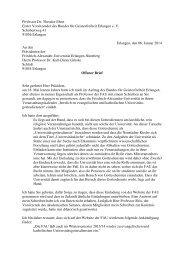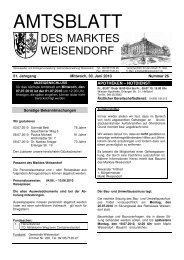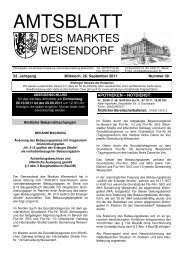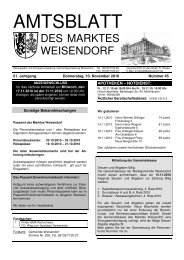Globalisierung - Realität und Ideologie.pdf - FEN
Globalisierung - Realität und Ideologie.pdf - FEN
Globalisierung - Realität und Ideologie.pdf - FEN
Erfolgreiche ePaper selbst erstellen
Machen Sie aus Ihren PDF Publikationen ein blätterbares Flipbook mit unserer einzigartigen Google optimierten e-Paper Software.
11<br />
Anhang 4<br />
GOVERNANCE IN A GLOBAL SOCIETY<br />
THE SOCIAL DEMOCRATIC APPROACH<br />
EQUAL OPPORTUNITIES AND PARTICIPATION FOR WOMEN AND MEN,POOR AND<br />
RICH, DEVELOPING, TRANSITIONAL AND DEVELOPED COUNTRIES<br />
SUMMARY<br />
I The Social Democratic Approach to Governance in a Global Society<br />
1. Under the conditions of globalisation, democratic governance has to be reinvented. The aim of the social<br />
democratic movement is to reconcile its historical values - social justice and democracy - with the new<br />
challenges, tasks, forms and instruments of politics that globalisation will bring about. A global governance<br />
concept has to be developed opposing the neo-liberal market ideology, the neo-conservative agenda, and<br />
the unilateralist approach. This alternative has to bind the dynamics of the global market to social, ecological,<br />
and democratic values. This requires citizens, women and men alike, their organisations, parties,<br />
parliaments and governments to act globally and in accordance with democratic principles.<br />
2. Globalisation is calling into question very basic elements of the political and social order we are used to.<br />
The nation-state which for more than a century has been a central element of the political, social and<br />
economic order of more and more of the world’s societies, is losing strength and importance. New transnational<br />
units, like global and regional organisations or trans-national corporations, and sub-national units,<br />
like increasingly autonomous sub-regions and municipalities are taking over parts of the state’s discretionary<br />
capacities. In many policy fields, domestic solutions alone are no longer sufficient or adequate and have to<br />
be replaced or accompanied by internationally coordinated political efforts.<br />
3. Globalisation is a little like technological progress. In itself, politically or on an ethical level, it is neither<br />
good nor bad. Technological progress has allowed us to manufacture both increasingly devastating weapons<br />
and increasingly effective medicines and vaccines. The same is true of globalisation, which we may define<br />
as integration on a global scale of both commercial exchange and financial flows and of cultural contacts and<br />
information.<br />
4. Globalisation is a source of wealth – firstly of economic wealth. More and more jobs across the world are<br />
dependent on international trade and/or have been created by trans-border investment. Thanks to<br />
economies of scale, wider markets lead to increased productivity and thus to more rapid growth in incomes<br />
and the standard of living.<br />
5. Globalisation is also a source of cultural and social wealth thanks to the exchanges it generates. It leads<br />
to greater international openness, access to the cultures of other countries and learning about diversity. It<br />
may become a source of greater freedom by allowing all the world’s citizens to construct an identity beyond<br />
the strict confines of language, nation, religion or place of birth.<br />
6. Globalisation opens up chances and opportunities, especially for those who have not profited from the<br />
economic order of the post-World War II era. Hitherto unincorporated areas are being integrated into global<br />
trade and new technological and productive centres are springing up all over the world. The end of the Cold
















